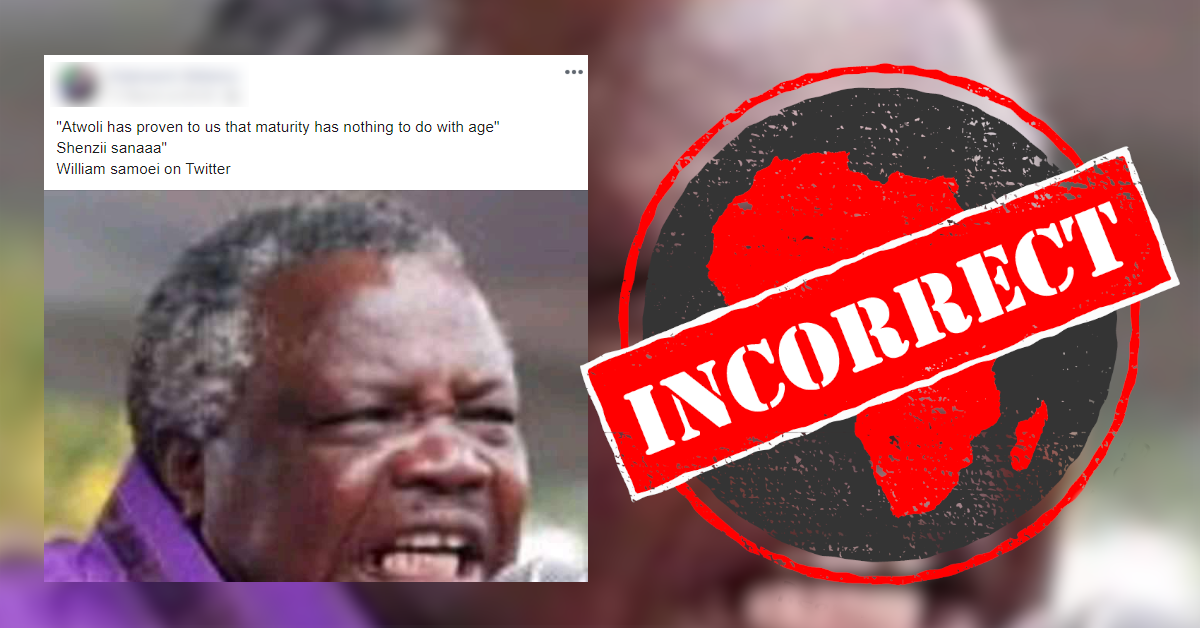A post on Facebook claims Kenya’s deputy president William Ruto insulted the secretary general of the country’s umbrella trade union body.
The post, from 11 March 2020, shows a photo of Francis Atwoli, secretary general of the Central Organization of Trade Unions. It’s captioned: “Atwoli has proven to us that maturity has nothing to do with age. Shenzii sanaaa. William samoei on Twitter.”
“Shenzi sana” is Kiswahili for “what a fool”. Ruto’s full name is William Samoei arap Ruto.
On 10 March, a screenshot of a tweet from the account @DpWilliamSRuto was shared on Facebook with almost the same wording. "Atwoli has proven to me 'Maturity has nothing to do with age'. SHENZI sana," the screenshot reads.
It was posted with the comment: “I lack words. Ruto, the ‘godly’ man gives a rejoinder. Kenyan drama, but again tossing his phone in anger is stupidity........his generation will pay for his pride.”
This is an apparent reference to Atwoli throwing his cellphone at a press conference on 9 March. The incident was widely reported in the Kenyan media.
Atwoli had reportedly called for Ruto’s arrest for the deputy president’s alleged involvement in a fraudulent KSh39 billion arms tender deal. The trade union boss became so angry he smashed his phone to the floor.
Did Ruto then insult Atwoli on Twitter?

The tweet was not from the deputy president’s official Twitter account. The handle @DPWilliamSRuto is run by someone who calls themself “William Samoei Ruto Fan, PhD”.
The original tweet was from 9 March, the same day Atwoli called for Ruto’s arrest at the press conference.
Although Twitter has “restricted” views of the fan page, the tweet is still online.
The deputy president’s official Twitter name is “William Samoei Ruto, PhD”, with the verified handle @WilliamsRuto. – Dancan Bwire
The post, from 11 March 2020, shows a photo of Francis Atwoli, secretary general of the Central Organization of Trade Unions. It’s captioned: “Atwoli has proven to us that maturity has nothing to do with age. Shenzii sanaaa. William samoei on Twitter.”
“Shenzi sana” is Kiswahili for “what a fool”. Ruto’s full name is William Samoei arap Ruto.
On 10 March, a screenshot of a tweet from the account @DpWilliamSRuto was shared on Facebook with almost the same wording. "Atwoli has proven to me 'Maturity has nothing to do with age'. SHENZI sana," the screenshot reads.
It was posted with the comment: “I lack words. Ruto, the ‘godly’ man gives a rejoinder. Kenyan drama, but again tossing his phone in anger is stupidity........his generation will pay for his pride.”
This is an apparent reference to Atwoli throwing his cellphone at a press conference on 9 March. The incident was widely reported in the Kenyan media.
Atwoli had reportedly called for Ruto’s arrest for the deputy president’s alleged involvement in a fraudulent KSh39 billion arms tender deal. The trade union boss became so angry he smashed his phone to the floor.
Did Ruto then insult Atwoli on Twitter?

Tweet from Ruto supporter
The tweet was not from the deputy president’s official Twitter account. The handle @DPWilliamSRuto is run by someone who calls themself “William Samoei Ruto Fan, PhD”.
The original tweet was from 9 March, the same day Atwoli called for Ruto’s arrest at the press conference.
Although Twitter has “restricted” views of the fan page, the tweet is still online.
The deputy president’s official Twitter name is “William Samoei Ruto, PhD”, with the verified handle @WilliamsRuto. – Dancan Bwire
Republish our content for free
For publishers: what to do if your post is rated false
A fact-checker has rated your Facebook or Instagram post as “false”, “altered”, “partly false” or “missing context”. This could have serious consequences. What do you do?
Click on our guide for the steps you should follow.
Publishers guideAfrica Check teams up with Facebook
Africa Check is a partner in Meta's third-party fact-checking programme to help stop the spread of false information on social media.
The content we rate as “false” will be downgraded on Facebook and Instagram. This means fewer people will see it.
You can also help identify false information on Facebook. This guide explains how.


Add new comment